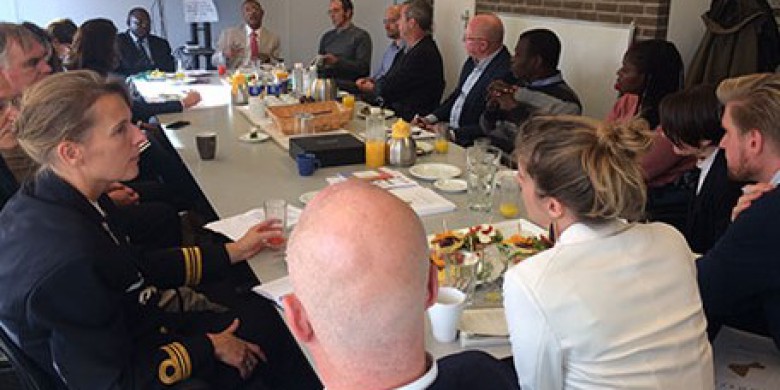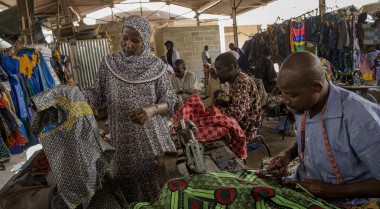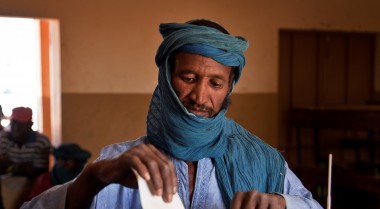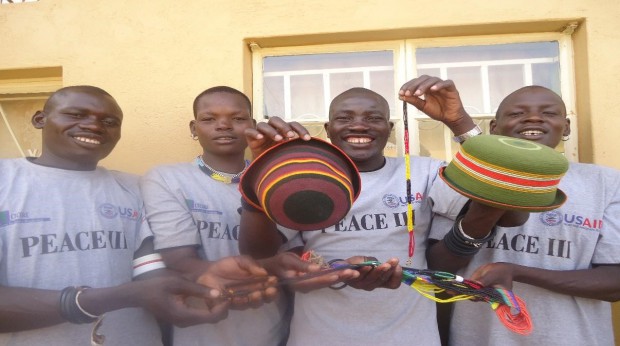
Call for stronger local accountability and ownership of European Union support in Mali
Researchers and civil society actors from Mali were in Brussels from the 7th to the 11th of November for the final conference of the Woscap project - where EU's conflict prevention and peacebuilding capabilities were assessed. Mali was a case study on which both Professor Moussa Djiré, dean of the University of Bamako and Thera Boubacar, coordinator of WANEP-Mali participated. Key recommendations for the EU included the need for greater visibility and engagement with all local actors on the support provided to increase transparency of EU interventions as well as accountability towards and ownership by local actors and communities.
GPPAC arranged for engagements with key actors working on Mali and the Sahel at the European External Action Service, the Dutch Ministries as well as think tanks, academia and NGO's.

Whose security? The need to localise security interventions
EU actors underscored the intrinsic link between security and development. This link was acknowledged by Professor Djire and Thera Boubacar but they highlighted the need to ensure security is provided both for the state and all of its people. As Mr. Boubacar put it, through their research on Human Security it became apparent that in some instances "people felt happier when there was no government presence or interference". Support to security forces and a national security approach alone will thus not be sufficient to provide sustainable and inclusive peace and stability in Mali. Professor Djire highlighted that "Decentralisation, regionalisation and civil society development all have an important role to play in helping to provide long-term solutions for the conflict in Mali" and that "socioeconomic development of the marginalised regions, as well as the distorted power balance between the local and the national in the actual functioning of the Malian State constitute longstanding grievances that fed the conflict". Greater attention to the local accountability, transparency and ownership of the government and security provision must therefore be a central endeavour of all initiatives.
This also raised the question on how external security actors in Mali, including Minusma, the EU and member states are being perceived by local actors. According to Professor Djire the research highlighted this as a problematic area "People make no difference between the French and EU interventions" and there is a perception that "Mali is now being occupied by its liberators, mainly France". Woscap recommendations particularly highlight the need for greater visibility and engagement with all local actors to increase transparency, accountability and ownership of those actors. This, as well as the central role of the Malian government in such a process, was also highlighted and recognised by Dutch researchers and NGO's present at the Lunch meeting GPPAC organised.
Great political appetite for the G5 Sahel.. but which space for local actors?
EU and Dutch actors underscored the importance of the G5 Sahel in view of the pledging conference that will take place mid-December. The Malian actors recognised the active participation and contribution of the five African states and acknowledged the importance of a regional approach to the Sahel. But while it is presented as a security and development initiative greatest attention has so far been paid to the military side.
This is recognised by the EU, the Malian government and Civil Society alike.Members of the Malian government indicated that "Only a developmental solution will assist the country in emerging from the crisis, not a military one". The delegation underscored the need to re-establish the confidence in the state and meet the needs of the local populations for interventions to be sustainable. Yet, the G5 permanent structures do not ensure adequate participation of non-state actors on security and development issues as witnessed by the recommendations from regional women's groups.
Follow-up
The office of the EU's special representative for the Sahel Region recognised the need for greater engagements and agreed, as a first step, to have a broad discussion on the EU's interventions co-organised with the University of Bamako. Wanep and GPPAC will also continue to support inclusiveness and collective action of civil society and help ensure that interventions and coordination mechanisms build on existing initiatives and structures. Wanep's role as convenors of the EUCAP Sahel Civil Society Platform will be particularly useful in this. To ensure local accountability and human security are taken into account and Woscap recommendations popularised and used, GPPAC will follow-up with Dutch actors, including the Ministry of Foreign Affairs and of Defence to jointly discuss the challenges faced in Mali and what concrete actions could be taken.


